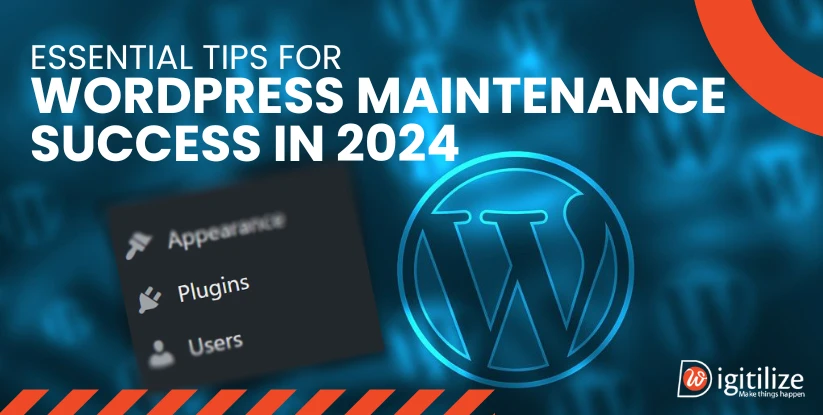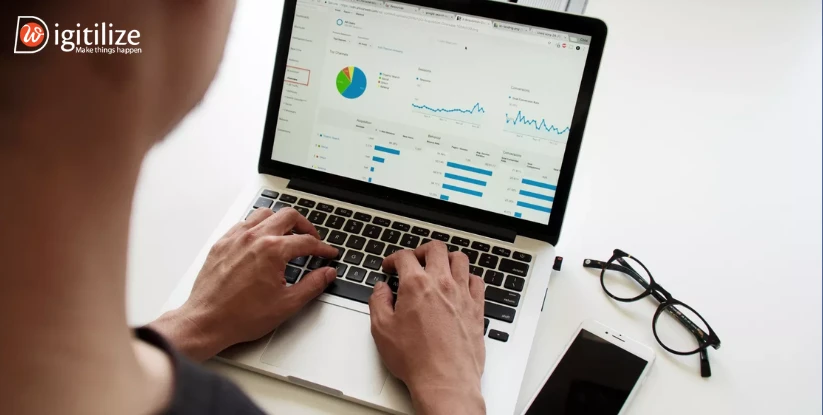Essential Tips for WordPress Maintenance Success in 2024
 Have you ever wondered which crucial WordPress site maintenance activities you should carry out regularly? While they don’t take much time, routine WordPress maintenance chores guarantee that your website is safe, secure, and performing at its best. So, it is crucial to discuss the essential tips for WordPress maintenance success in 2024.
But big changes are coming, and WordPress maintenance will probably look different from what we do now for WordPress websites. There may be an overlap when the distinction between optimisation and maintenance grows increasingly heavy. In this case, you might be able to enhance your website with a quick review and some fresh suggestions in the WordPress maintenance section.
Have you ever wondered which crucial WordPress site maintenance activities you should carry out regularly? While they don’t take much time, routine WordPress maintenance chores guarantee that your website is safe, secure, and performing at its best. So, it is crucial to discuss the essential tips for WordPress maintenance success in 2024.
But big changes are coming, and WordPress maintenance will probably look different from what we do now for WordPress websites. There may be an overlap when the distinction between optimisation and maintenance grows increasingly heavy. In this case, you might be able to enhance your website with a quick review and some fresh suggestions in the WordPress maintenance section.
Reasons for WordPress maintenance in 2024
-
Avoid Downtime on Your Website
-
Removal of Unwanted Plugins and Themes
-
Website Backups
-
Most recent fixes and features
-
Optimisation of Site Performance
 WordPress maintenance improves the functionality of your website, which makes it crucial. Website visitors will abandon your site if it loads slowly or takes a long time. If people have to wait for anything to load slowly, they won’t stay around for very long. That’s why it is important to discuss the essential tips for WordPress maintenance success in 2024. People are more likely to stay on your website, though, if you optimise it and make sure it loads quickly. And that implies that they will have more opportunities to view your material, discover more about your goods and services, and continue to be interested in your business!
WordPress maintenance improves the functionality of your website, which makes it crucial. Website visitors will abandon your site if it loads slowly or takes a long time. If people have to wait for anything to load slowly, they won’t stay around for very long. That’s why it is important to discuss the essential tips for WordPress maintenance success in 2024. People are more likely to stay on your website, though, if you optimise it and make sure it loads quickly. And that implies that they will have more opportunities to view your material, discover more about your goods and services, and continue to be interested in your business!
Essential tips for WordPress maintenance success in 2024
-
Backup regularly
-
Change passwords
-
Update all WordPress files
-
Delete unnecessary and unreferenced files.
-
Check performance
 When they initially launch their website, many users enhance WordPress speed and then forget about it. You update the theme, install new plugins, and add new content over time. Any of these elements might have an effect on the performance of your WordPress site. Not only can faster websites enhance user experience, but they also raise your search engine rankings. This is one of the essential tips for WordPress Maintenance success in 2024. For this reason, you should evaluate your website’s performance in-depth frequently. Don’t confine your site performance assessment to making your homepage better. Test all of your key pages and your most well-liked material as well.
When they initially launch their website, many users enhance WordPress speed and then forget about it. You update the theme, install new plugins, and add new content over time. Any of these elements might have an effect on the performance of your WordPress site. Not only can faster websites enhance user experience, but they also raise your search engine rankings. This is one of the essential tips for WordPress Maintenance success in 2024. For this reason, you should evaluate your website’s performance in-depth frequently. Don’t confine your site performance assessment to making your homepage better. Test all of your key pages and your most well-liked material as well.
-
Examine and correct any broken links
-
Check and adjust your website frequently for mobile devices
-
Update the plugins and themes for WordPress
Costs of Website Maintenance
 For optimal user experience and performance, WordPress websites require regular maintenance. It is important to understand the financial implications associated with this crucial aspect of your online presence, though. We’ll talk about the website’s potential WordPress maintenance costs here.
For optimal user experience and performance, WordPress websites require regular maintenance. It is important to understand the financial implications associated with this crucial aspect of your online presence, though. We’ll talk about the website’s potential WordPress maintenance costs here.
-
Costs of Hosting
-
Domain Renewal
-
Plugins and Themes
-
Security and Backup Services
-
Material Updates
-
Professional Services
FAQ
Frequently Asked Questions
By maintaining WordPress, you are optimising your website for search engine optimisation. The benefits of maintaining a WordPress website are numerous. It keeps your website quick and safe while lowering unscheduled downtime.
In 2024, a WordPress website must include responsive design, search engine optimisation, e-commerce functionality, GDPR compliance, and strong security measures. In order to satisfy customer expectations and industry requirements, these elements are essential.
WordPress provides an easy-to-use and affordable way to revive an MVP that has failed. Its adaptability and large plugin library allow you to swiftly improve and modify your project. Based on user input and evolving requirements, you can select it.
WordPress upkeep is usually simple, and some people might even view it as routine. That being said, because it might still take a lot of time, you shouldn't take it lightly.
A WordPress website requires around one hour of maintenance each week on average, however this might vary if bespoke programming is required.
WordPress websites indeed require routine maintenance to keep them operating at peak performance. In addition, routine maintenance helps protect your website from any security breaches, minimises needless downtime, and raises your search engine results.

